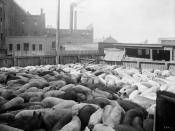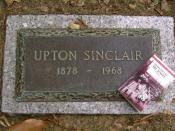Upton Sinclair's book "The Jungle" describes working conditions in turn of the century meat packing plants. Sinclair used workers rights as a platform to help persuade the socialist progessivist movement in the early 20th century. This paper is a look at particular techniques Sinclair used and productive it was.
Industry in general has long been a mostly unregulated enterprise since the beginning of the Industrial Revolution. Until recently, the government has not regulated industries like meat packing companies because these very companies supported the government. Conditions in the meat packing industry were particularly horrendous at the beginning of the 20th century. In 1906 Upton Sinclair shed light on the topic of poor conditions in these factories in his book entitled, "The Jungle". Sinclair gave vivid descriptions of the lack of sanitation and poor working conditions of the meat packers. "The Jungle" helped to create new laws and legislation that regulated how food-processing plants were to be run, as well as helped to push the progressive movement further into societies sight.
Sinclair used "The Jungle" to show the un-knowing public exactly what they were supporting when they went to the corner market to buy there meat. The average person did not know what went on at these plants or how their processed meat was made. Sinclair said that when these companies "...It would be doused with borax and glycerin, and dumped into the hoppers, and be made over again for home consumption." (Sinclair, 2) He also told of processing plants making large piles of meat and letting it stand, allowing rats to crawl around and relieve themselves on it. The owners seemed not to care that they were sending disease-ridden meat to the markets.
"The Jungle" not only described the horrible products being produced, but also the obscene...


